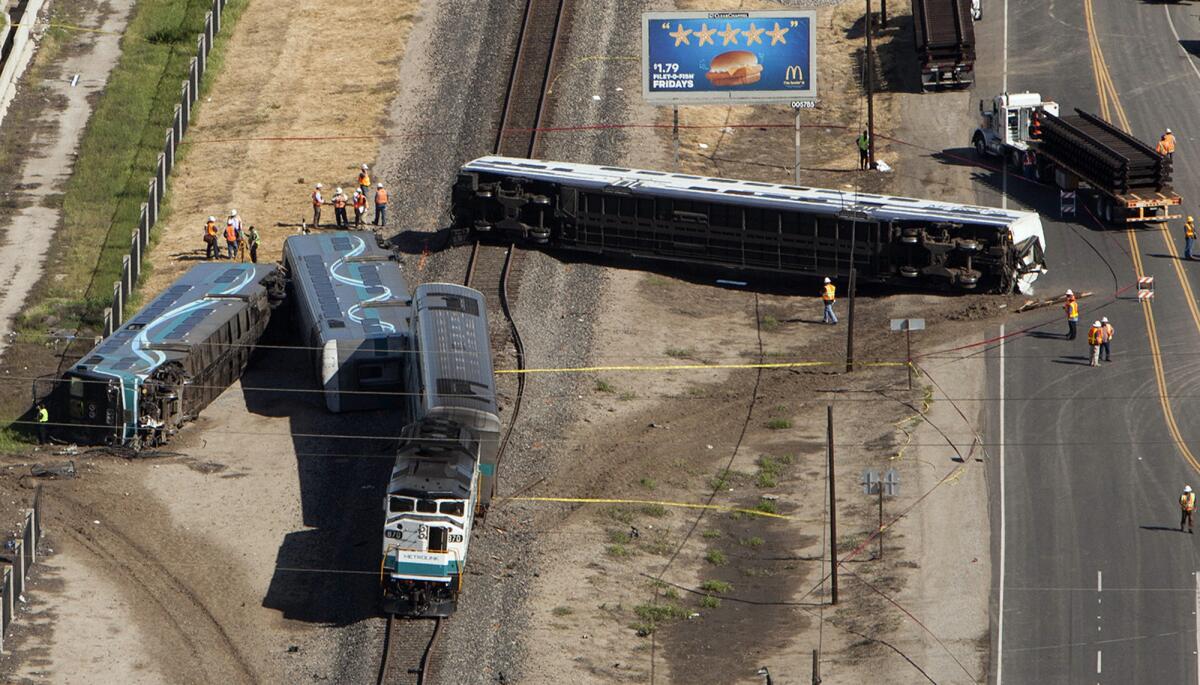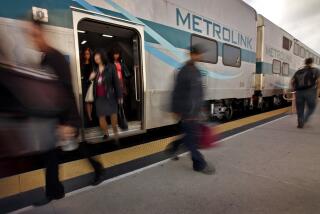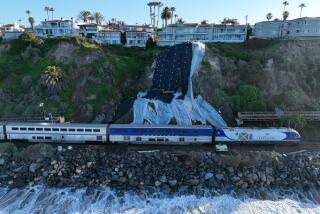Deadly Oxnard crash prompts Metrolink to put locomotives at both ends of trains

A Metrolink train derailed in February after colliding with a vehicle at a railroad crossing near Oxnard.
As a safety precaution stemming from February’s Oxnard crash, the Metrolink board on Friday approved an agreement that will allow the commuter railroad to place locomotives at both ends of its trains.
Metrolink, which serves six Southern California counties, will spend $23.9 million to lease 40 engines for one year from the Burlington Northern Santa Fe Railway Co.
The locomotives will take the place of Metrolink’s new crash-resistant Hyundai Rotem cab cars -- passenger coaches that include an engineer’s compartment. Metrolink has 57 of the units, which are designed to absorb impacts when accidents occur.
See the most-read stories this hour >>
Cab cars are used at the front of trains when they are being pushed from behind by locomotives--a common practice among the nation’s commuter railroads when trains reverse direction at the terminus of a line.
But investigators are now evaluating how well one cab car performed in the Feb. 24 Ventura County collision between a Metrolink train and a heavy-duty pickup truck and trailer at a crossing near Oxnard.
Officials say the lease will allow Metrolink to place heavier locomotives at both ends of trains until safety issues involving the cab cars are resolved. The units, however, will still be used to carry passengers.
“This is a preemptive measure taken out of an abundance of caution due to an unusual event,” said Art Leahy, Metrolink’s chief executive officer.
In the Oxnard crash, a train with a cab car in front derailed and several trailing coaches turned over on their sides, throwing passengers around their interiors. Twenty-eight people were injured, including the engineer, who later died.
Among other things, investigators are trying to determine if the cab car’s steel deflector, or cow catcher, failed during the collision, allowing wreckage to get under the wheels.
The National Transportation Safety Board, which is looking into the accident, has yet to determine the probable cause of the crash. NTSB officials have declined to comment on the investigation.
Leahy said three other cab cars have been taken out of service “due to a potential safety issue.”
The crash represented a setback in Metrolink’s campaign to acquire advanced safety technology and rebuild public confidence after a 2008 head-on collision in Chatsworth that killed 28 people and injured 135.
The effort included a $263-million investment in a fleet of Hyundai Rotem coaches and cab cars, which have a variety of safety improvments such as stronger construction and energy-absorbing crush zones.
Following an internal report about the accident, rail officials announced in early September that they would limit the use of Rotem cab cars and seek to lease engines from Burlington Northern. Several weeks later, the board authorized renting the locomotives.
Without the lease, officials say, Metrolink service would have to be cut almost in half from 165 trains a day to 80 or 90.
NEWSLETTER: Get the day’s top headlines from Times Editor Davan Maharaj >>
The plan’s $23.9-million budget will be used to pay for the lease, fuel, maintenance, modifications and adapting the Burlington Northern engines to Metrolinks’ positive train control emergency braking system.
So-called PTC, which relies on global positioning technology, digital communications and sophisticated computers, monitors trains and can automatically stop them to avoid accidents.
Follow @LADeadline16 for transportation and aviation news.
ALSO
UCLA football player is suspended indefinitely following arrest in rape case
Spencer Stone ‘awake, able to get out of bed’ day after life-threatening stabbing
L.A. drivers, beware: #Obamajam, two major sports matches will make traffic miserable
More to Read
Start your day right
Sign up for Essential California for news, features and recommendations from the L.A. Times and beyond in your inbox six days a week.
You may occasionally receive promotional content from the Los Angeles Times.







